Finishing Stranger of Paradise: Final Fantasy Origin [Part 2] - I Have A Conspiracy Theory: This Is A Self-Plagiarism
By ZombiePie 5 Comments
Author's Note: This is Part Two of a two-part series. If you missed the first part a link is provided below. Also, be aware that this series delves in and discusses SPOILERS! You have been warned!
Part 6: The Middle Act Slog
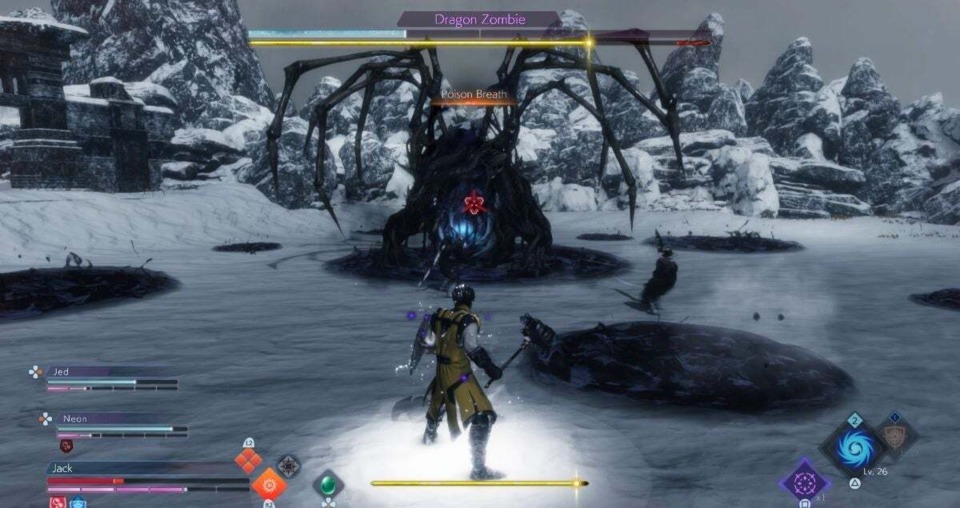
When you compare it to the field of the Souls genre, the skill floor for Stranger of Paradise is low, and that's often its best attribute. Sure, there are animation priorities, I-frames, and specific bosses that are significantly more manageable if you know how to cancel their finishers. Nevertheless, as long as you put in your time, the likelihood of finishing it is reasonably high. Yes, the comprehensive classes show depth, and even more complex encounters require you to develop and execute specific strategies. Nonetheless, as expressive as the gameplay can be, there is a point near the middle where the moment-to-moment gameplay starts to feel like you are going through the motions. You are free to make the game as complicated as you want, and the cluttered inventory management suggests as much, but you don't need to care about maximal leveling in this game or being 100% on point to get through Stranger of Paradise. Knowing how and when to bounce between the jobs is fun. Still, considering the amount of balance across all of them, it's a task you, as the player, assign yourself rather than the game demanding such organic experimentation. Likewise, as we will review soon, the sense of "specialness" between the jobs ebbs significantly past the game's halfway point.
But that's ignoring the more significant issue with the middle and final acts of Stranger of Paradise. In this game, you become a paper shredder, making most of the preamble leading to the boss battles more of a trudge than a rewarding trek to glory. Indeed, there are spikes in difficulty when you encounter those boss battles and explore optional side content, but most of what you fight is a cakewalk. You can try to address this problem by bumping up the difficulty setting, and I should mention I played this game on "normal" for most of my playthrough. Nonetheless, increasing the gameplay's grit doesn't fix its issues with its lack of level or enemy variety. Especially when you start to narrow your job search, you sure do see the same bats, birds, wolves, and goblins, and considering their gimmicks and attack priorities don't change as the story progresses, the game mechanically loses steam quickly. Even when you swap out jobs or customize special abilities or passives, you watch the same finishing animations and quips to a nauseating degree.

Looking back at my first post, I should have spent more time discussing how little interest this game has in rocking the boat regarding level design and mission structure. Yes, this game's silly nature of Jack wanting to kill everything in front of him matches the game's "Just move forward and break shit" structure, but that's all the game gives you to keep your interest running. If you are starting to grow tired of the fiddly inventory system or the annoying loot management problems, there's a possibility this middle act is when the game breaks for you. The levels are linear corridors that distract you with their nostalgic renditions of Final Fantasy classics, but they aren't "fun." The interactive elements of the environments are few and far between, and there aren't enough examples of the game doing unique things to differentiate them. The vast majority boils down to the most inane switch and level puzzles, which bake a groan-inducing amount of backtracking into every mission. The weather-swapping mechanic with the Final Fantasy XIII level was interesting. Still, it's a pallet swap of the night-day cycle seen in at least two previous environments.
On top of that, the willy-nilly nature of the worlds sometimes makes it a pain in the ass for you to know where you need to go or what you need to do. For example, there are a ton of switch puzzles in the Final Fantasy IV and V levels, and the game fails to clue you into how to use them or where they might be to open up new paths. Worse, some of these levels are outright boring and painfully repetitious. The number of times you explore luscious green forests or damp grey caves is a bummer, and there are occasions, like with the Final Fantasy VIII lava cave, when the developers outright selected the WRONG LEVEL to represent a game. Correspondingly, HOT DAMN is the Final Fantasy XV level DIRE! It's an interior office level and the least compelling level in the game. The graphical fidelity and production values of the game's backdrops and environments are also all over the place. On several occasions, because of the monotonous level design, finding corner exits or passages that lead to necessary quest items or interactable objects is more challenging than it has any right to be. The Final Fantasy XII tomb level is the worst example of this problem, which features repeating sandy brown walls and backgrounds, which can make it visually impossible to figure out where you are without the odd colored light filter. It's one thing to call this game a mechanics-focused experience from Team Ninja, but that should not be an excuse to handwave the enormous amount of copy-paste-level design.

Nevertheless, the real reason I found the middle portion of this game to be a slog stems from it failing to recognize what makes its opening and concluding acts so memorable. After Astos gives Jack the task of beating the Four Fiends, the story, one of the game's best parts, only comes out in spurts, usually at the ends of boss battles. Even then, from Mount Gulg to the fight against the Ur-Dragon King in Vigilia Court, the story is played relatively straight and doesn't do enough to revel in its schlock as it does in its initial chapters. Many people talk about the Sinatra scene in the field or Jack pulling out an iPod to listen to Limp Bizkit, but until we get to the game's concluding two levels, nothing in it even remotely matches those moments. Considering where this game's narrative ends up, it's bananas that it doesn't do more to pre-empt itself. Certainly, there's a recurring story beat about the party members trying to jog Jack's memory, and his rebuffs are a continual source of hilarity. Nonetheless, it's hard to get invested in these moments, considering everyone besides Jack feels like a soulless automaton. What few quips the supporting characters get are, at most, ten to fifteen seconds of witty banter while Jack is either screaming or acting incredulous.
Tangent: ALRIGHT, FINE! Let's Talk About Me Playing This With A Mouse And Keyboard Control Scheme!
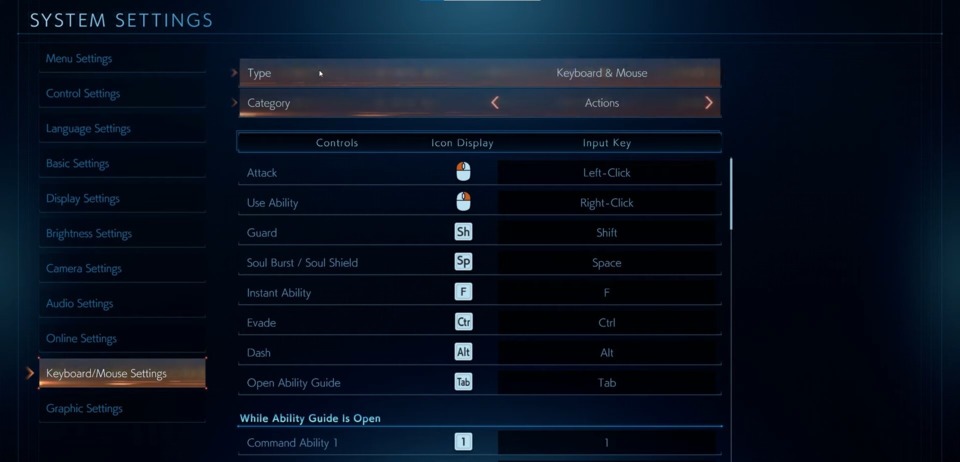
I'm about to say something that will either piss you off or immediately cause you to click out of this blog, so get ready. Alright, are you prepared for what I am about to say? I play fighting and Souls games using a mouse and keyboard control scheme. Yeah. Crazy, right? Well, there's a reason why I play a majority of games this way, and part of it stems from a congenital joint issue and also my personal preference for video game controls. I like having things bound to hotkeys when playing action games, as if I am playing Diablo or World of Warcraft. I even have one of those large MMO mice with buttons on its side to make this easier. I also started this weird habit of playing every Final Fantasy game on a mouse and keyboard when this series began as an odd attempt to antagonize long-standing fans. I apologize for the latter; however, with age, this control option remains a lifeline for me. The second series of the Xbox Elite controller remains my favorite console controller today, but sometimes, I still find myself defaulting to old habits.
Playing Souls-like games on a mouse and keyboard is not a great time, but it is also not the worst thing you can do to yourself. With Final Fantasy Origin, I thought the granularity with where I could aim and place spells was better with a mouse than what I found with a traditional controller—similarly, ranged attacks, whether they be bows or spears, are noticeably more effortless with a mouse, compared to a controller, even when factoring in the game's highly generous auto-aim. However, using a mouse and keyboard setup has some pretty big pitfalls. The biggest one comes from the job-specific special abilities and parry mechanics. Moving and using these abilities on a hotkey isn't a great time, leading to frequent awkward finger reaches that remind me of using an Emacs text editor. By default, many hot-swappable passives and alternate abilities require you to use Ctrl or Alt, then slam a numerical number on the Number Pad or the standard array of numbers on your QWERTY keyboard. This layout isn't a problem in low-stakes battles, but with bosses with incredibly unforgiving animation priorities and I-frames, this can often lead to experiences that feel impossible. Or, at least, that's the case in standard Souls games. With Stranger of Paradise, even with my sub-optimal controls, I still felt like a walking murder machine able to level all that stood before me.
Part 7: The Difficulty Drops Off A Cliff Until The Final Battles
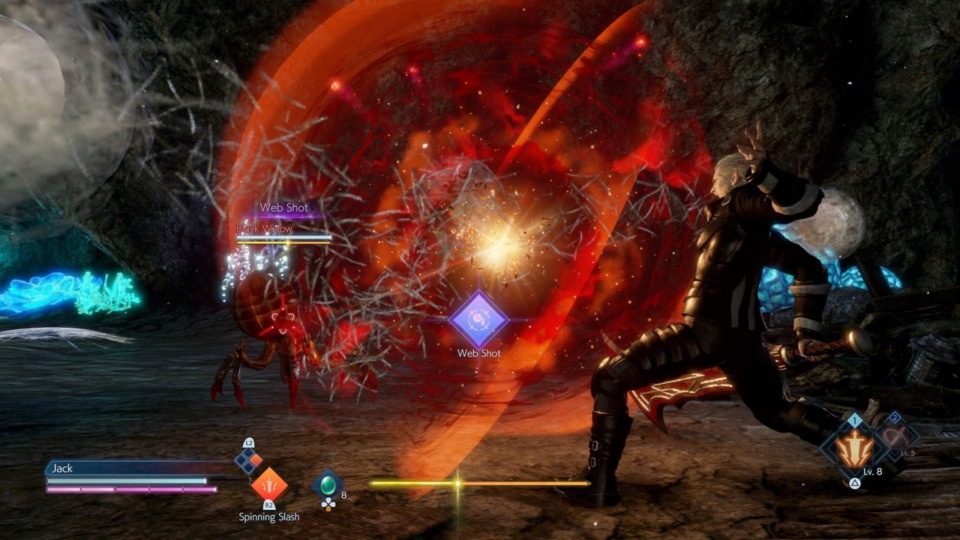
The gameplay and job system in Final Fantasy Origin was the priority for Team Ninja from beginning to end. It is the part of the game that feels the most polished, and for the most part, it drives your interest while you explore a handful of bland, meandering, and essentially linear environments. As I discussed in the last episode, there are many ways in which the Job and Affinity Systems opt you into new build paths and playstyles even if you don't immediately enjoy a new job. For example, I could not stand the Paladin, but after spending a few experience orbs (i.e., Anima Shards), I could get what I wanted from it and not have to worry about grinding away at it to keep my version of Jack on his feet during the game's final hours. Mostly, I enjoyed Origin's tech trees and swappable special moves and passives, but these systems have a few consequences. The first involves the breadth of your options and how the game buckles under its weight. With you able to bolt anything onto Jack at the drop of a hat, with zero consequence, none of the level-based elemental or combat gimmicks meant to impede your progress ever amount to much. Whole set pieces and bosses feel like they should be gear checks, and instead, the most superficial prep work can reduce them to dust.
This point of order leads me to another problem that rears its head in the back half of Stranger of Paradise. With so many jobs and gameplay mechanics, there does come a point when Team Ninja triaged their priorities and duplicated some of the design and animations across different job classes. Two jobs with a modified parry mechanic exist. There's the Swordfighter's Interception ability and the Ronin's Shenshin Stance. The difference is that one is easier to pull off but does less damage, and the other is the inverse, but that's it. They both have the same gimmick, and taking the time to level a job only to discover their capstone ability is a palette swap of another you have already seen or used is always a letdown. There is another significant downside with the capstone-ish nature of the job system when you err closer to the end. With so many top-tier jobs being better permutations of earlier jobs, when you start duel-wielding the expert classes, you can often discover broken strategies, which means you have zero reasons to revisit your progress with earlier tech trees. For example, when you unlock the Sage job, there's no real reason to play as a White Mage. Instead of keeping that job marginally in my rotation, I spent a bunch of experience orbs to max it out and move on with my life. There's a very "Thank you for your service, now goodbye" element to this job system, and I'm not suggesting that's a bad thing, as the natural exploration of new options and playstyles is rewarding.
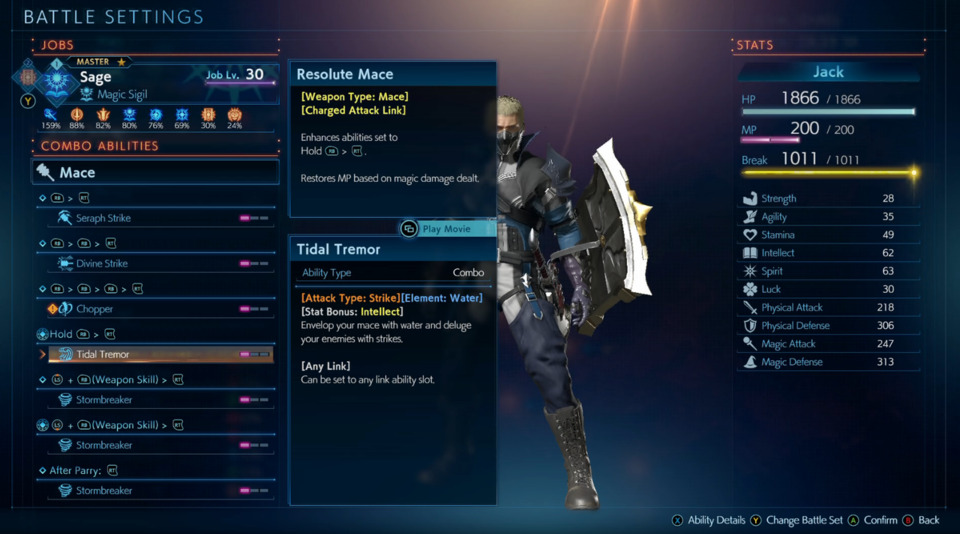
And GOODNESS, are the last handful of jobs in this game outright broken! Assassin, Sage, Liberator, and Tyrant outpace their proceeding jobs, and it is not even a contest. Liberator is an excellent backup job because it can tank even the gnarliest boss moves without you dying. Tyrant's ability to attach any elemental affinity to your base weapon attacks means you can still take advantage of an elemental-based weakness with a melee job even if you are not a fan of magic casting. Sage being able to switch between black and white magic is BUSTED. The minute it becomes available to you, the fact it can do everything means you have virtually no reason to use any of the other magic-based job types. With Sage, I was not in low health at any point until the final levels because I always had the Regen status buff active, which was part of the reason I could pop off the Ultima spell pretty regularly, which you can use after three uses of white and black magic. The Assassin gains the ability to become invisible, which not only directs enemies to your party members but allows you to position yourself better to take advantage of back-attack opportunities, which, in the case of the Assassin, will enable you to stack critical hits and quickly waste away non-boss enemies in one go. Invisible is an ability I still feel like wasn't properly play-tested because being able to make enemy encounters not detect you for about half a minute is insane in a Souls-like game.
With most games of this type, you always feel like the difficulty curve is there, breathing down your neck. Even with Nioh and Nioh 2, there's a gap between what you want to have and what you can have, and that's not the case in Stranger of Paradise. Not only does the game drop shiny trinkets on the floor with every step you take, but every weapon type has something cool it can do that other weapons can't. You use these weapon abilities by either inputting a specific series of button combinations or by using R2 to trigger one you have on tap. And much like the job-specific abilities, the unlockable weapon-based ones are screen-filling super moves that utterly obliterate every non-boss enemy in the game. As a result, I don't think you can make a single character build past the second chapter that doesn't have at least one super move that instantly kills everything on the screen. It sounds odd, but I think this game gives you too many tools to put into your toolbox too soon. There's a campy charm to Jack being the badass he claims to be, but I genuinely feel you kick too much ass in this game for too long.
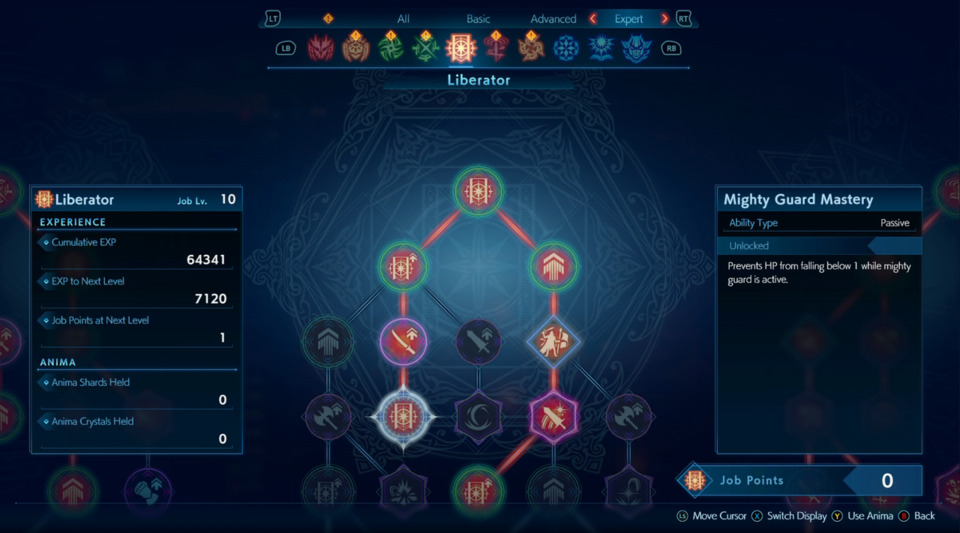
And I hate to bring up this topic again, but it's such a pain in the ass to synthesize all of the information and options this game gives you at the start and end of every mission. Whenever I finished an assignment, I felt like I spent ten to fifteen minutes alone trashing low-tier items and re-equipping my characters with better costumes and weapons that fit new job affinities or upcoming environments. Then, I would spend another ten minutes leveling up my characters and another seven or eight minutes swapping newly unlocked abilities into obtuse and obscure menus that were a pain to find. I dreaded seeing the pop-op when filling up a core on a job's tech tree, finding it unlocked a new combo, needing to remember the combo before bopping out, and then needing to track it down on a screen two or three removed from where I unlocked it. The entire process is so Byzantine that I never approached fluency whenever I had to engage with it. As much as this game banks on player exploration of its jobs, it is downright SHAMEFUL how poorly designed the menus are in this game. There are many things to use to customize your characters to make them look and feel unique, yet the entire process of doing so completely sucks.
Part 8: The Job System Might Keep Your Attention To The End, But Everything Else Is A Mess

But it's not all doom and gloom in Stranger of Paradise! First, I want to thank the developers for including the Anima Shards and giving players a viable way to level up unused or new job classes without grinding. Stacking these resources by refining accessories, which are not rare by any stretch of the word, leads to a relatively smooth experience when finding the high-tier or expert jobs that fit your playstyle. These shards, combined with the brief and straightforward side quests, which are inane, allow you to explore combo moves and new passive abilities more freely than in Nioh. And at least finding all the cool stuff with every job is a helluva time! Your adventure becomes more visually compelling when you get to the latter portions of this game and utilize some of the flashier finishers. Using the kick ability with the Ninja to perform Izuna Drops or spinning around in a whirlwind of death as the Assassin are fun moves that add some much-needed visual variety to any given playthrough. And using these abilities is not an entirely thoughtless process itself. Even popping off Ultima requires strategy and setup, which makes its grandiose enactment all the more gratifying.
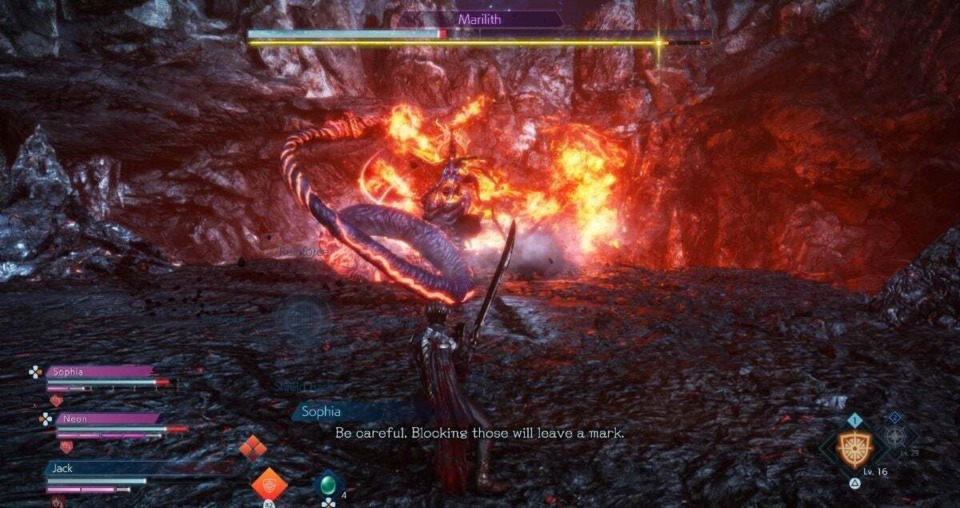
Likewise, the Four Fiends and what follows and precedes them are also visual treats. Maybe it was just me, but each Fiend was relatively straightforward as their tells and cues on when to strike and avoid their worst attacks were clearly prompted and signaled in-game. Correspondingly, their unique animations, forms, and gimmicks seamlessly tie into their respective environments. There's one battle against the Dragon Zombie that I thought was a complete annoyance, but that largely stemmed from it burrowing into the ground and only partially revealing its body to you, which makes figuring out its cues and invincibility frames harder than some of the bosses that even succeed it. If there is one thing I want to say as a possible negative, these bosses can go down quickly if you know what you are doing. Of the bosses before Jack's fight against Astos, most topped out at seven minutes or less. The second form of the Four Fiends usually, more often than not, boiled down to how quickly I could trigger a Break Move. Mercifully, your standard array of attacks has unique animations and timings with these fights, making it clear that considerable care was put into them, and these bosses do compelling things in their own right. They have techniques and special abilities no one else has and damage affinities, weaknesses, and resistances to specific weapon types. Much of this comes from Team Ninja's Nioh design playbook, but I'm not complaining.

Unfortunately, Stranger of Paradise feels like a game that knows how to frontload its content and stick its landings but has no idea what needs to exist between those moments. Imagine a gymnastic act that starts with the most impressive flip and pirouette, followed by a solid minute of sauntering with no feats of athletics. But then, in the last fifteen seconds, it ends with a fantastic running flip. That's how Stranger of Paradise feels with its weird interstitial menu-based NPC interactions and vanilla-ass side quests. The side quests especially feel insulting as the game's main story missions lack so much essential worldbuilding. While the side quests address this problem in a rather roundabout manner, all they ever ask you to do is explore reverse routes of pre-existing levels. They culminate with bosses that are more involved versions of enemy types you have previously fought dozens of times. Worse, the worldbuilding they provide is entirely told through audio logs, so obtusely hidden that it's easy to forget they even exist. And I don't care what other people say, but you must do these missions as they are critical in ensuring Jack and his party members are appropriately leveled. On top of that, there are a handful of side quests that add new jobs to the supporting characters.
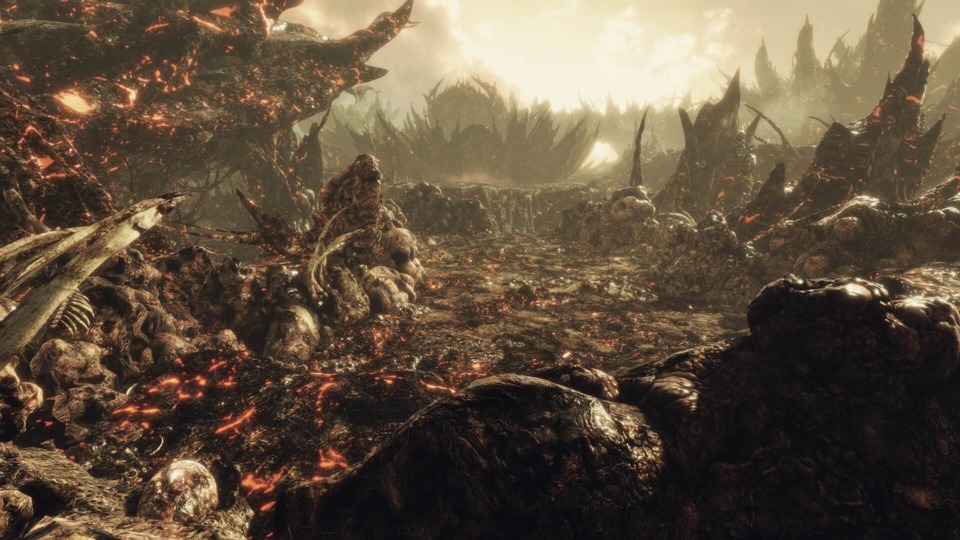
With the game already side-stepping RPG standbys like memorable merchants or recurring NPCs, a lot of your enjoyment, for hours, rides on your investment with its messy mechanics. Mercifully, things get far more interesting when the game's story lets go of its brakes. After you beat Kraken, Jack doesn't feel satiated with the defeat of the Four Fiends, and the party tags along in his quest to find Astos. Along the way, the party members begin edging Jack about his familiarity with specific enemies and his surroundings, which he initially rejects. Upon meeting Astos on a rendition of the Floating Continent in Final Fantasy VI, one of the most visually striking and involved environments, the dark elf finally peels away the facade. Astos emotionally prompts Jack to answer who he is, and while you battle him, you see flashbacks that establish their long-standing bromance. According to the scene, because Jack is a fist bump guy, going fist-to-fist with Astos jogs his memory, and he realizes he's not from Cornelia. A fist bump causes him to recognize he's living a lie. It's an incredible moment.
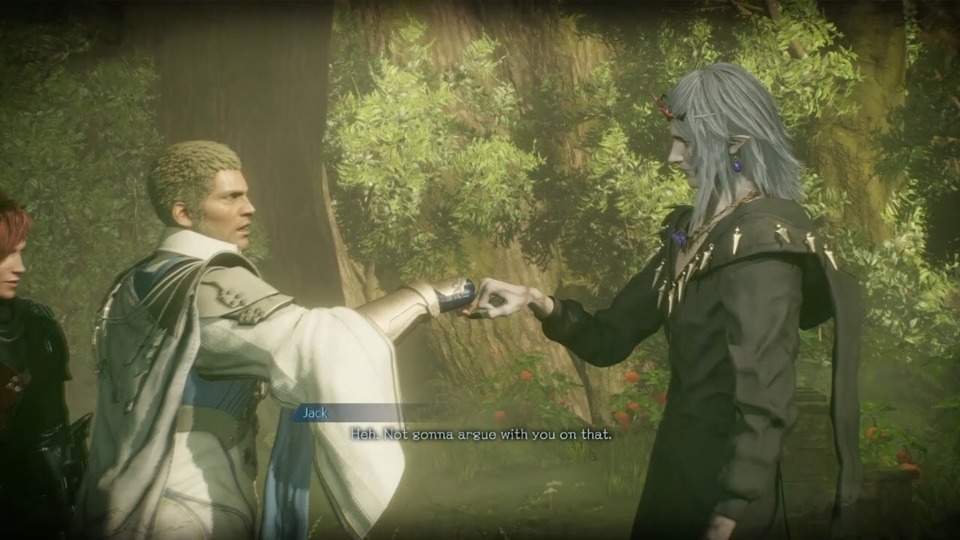
Stranger of Paradise hints that it takes place in a time loop, but it is during and in the aftermath of Jack's battle with Astos that it becomes evident. After Jack beats Astos's final form, we discover that this exact battle has played out precisely like this many times prior. This cycle of death and destruction unleashed by Jack is a conspiracy enacted by the Lufenians, who employ Jack to control the people of Cornelia to ensure they can continue experimenting on them like guinea pigs. However, eons ago, Jack devised a plan to break this cycle. After falling in love with Princess Sarah, he decided in a previous life to have Astos guide Jack and his crew to new locations that can create Chaos and summon him and transform Jack into a deity of destruction; only then will the Lufenians no longer be able to control Jack and use him as a pawn. Apparently, Chaos is an evil entity capable of granting one wish, and that wish is burning the system down to the ground, which fits Jack's mission of breaking the cycle. All of this information is told in a four to five-minute cutscene in the third to last level of the game. I suspect the game's story and Nomura's creative ambitions for Stranger of Paradise ended up being far shorter than the game Team Ninja made, hence why so much of it takes place at the start and end of the game. And while I love this revelation for all of the bat-shit crazy implications, there's no denying that it comes out of the ether. If the game had owned up to this being its genuine direction earlier, Stranger of Paradise would have been miles better as an overall experience.
Tangent: Why Is So Much Of The Core Story Told Through Hidden Collectibles? Who Thought That Was A Good Idea?
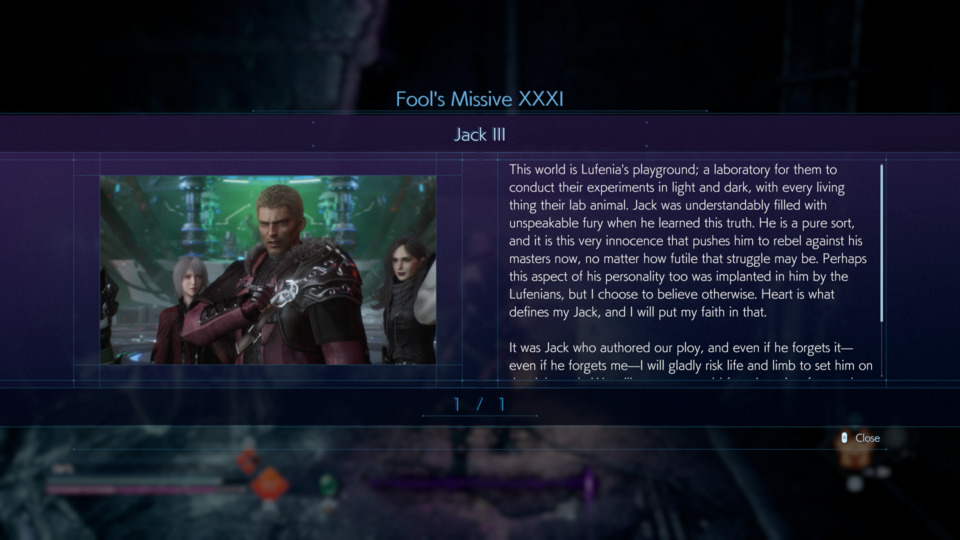
Those who have played Stranger of Paradise know of and likely applaud the peak insanity that this game reaches with its final three levels. From the moment you battle Astos forward, this game gets nuts. It's a pivot you know is coming, considering how much of this game has been spoiled thanks to the internet, but for those who live a sheltered life, there is the off chance that its narrative pivot takes them by surprise. Or so it seems. If you take the time to explore every avenue and corner in the game, you can get early hints that there is more to Stranger of Paradise than Jack is just an angry man. Astos has dozens of journal entries and data logs that lay out the ulterior motives of the forces guiding Jack's efforts, and it's simply bizarre how little of this information is brought to the forefront until the game's final act. Even tooltips during load times convey text written from the Lufenians' perspective and speak to their experiments and attempts to merge their world with the land of Cornelia. Can you name a single game that has whole swaths of its essential worldbuilding told through load screen tooltips, and that felt like a good idea?
How does the world of Cornelia constantly reset itself? Well, there's a journal entry you can find that details how the energy from the destruction of Cornelia powers the pocket dimension of the Lufenians and allows them to use their advanced technology to revert the universe to its former state. If you miss this data log, you never know this because at no point in-game does the story explain this plot point, and that's just one of many examples of the writing failing to opt players into its wacky universe. The stuff you miss out on isn't small potatoes; in this example, it's a core aspect of the game's narrative frame. And it's not as if all of these are on the main path of your regular route in their respective environments. Some logs have platforming puzzles before you can pick them up or require you to pop off special moves or class-specific abilities that nothing in the level explicitly hints towards. This game's story is a confusing mess, and that does a lot of its magnificent moments near its end an absolute disservice. Lacking an establishing frame, you are left with some stand-in characters that feel only partially told if you didn't do your homework.
Part 9: The Ending Of This Game Sure Is SOMETHING!
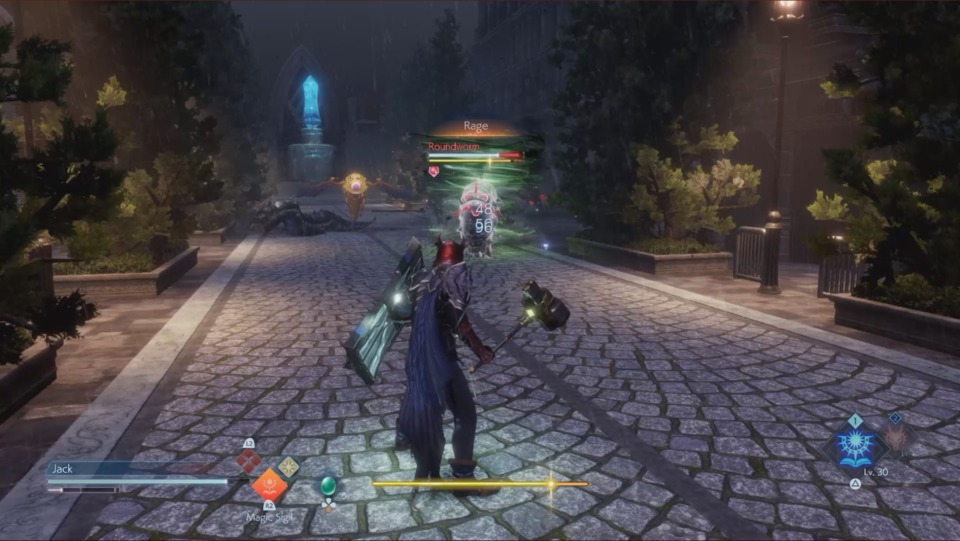
Oh, and it turns out the white bats Astos employs to direct Jack on his journey are nefarious Lufenians that Astos has captured and transmogrified into bats. Stranger of Paradise is a dumb game, and unlike previous Nomura outings, I love it. There's an almost brick-like nature to Jack even when he stares directly at the camera and lays out his plan to break the world from its torturous cycle. It's almost as if he's the head scientist in a 1960s monster movie summarizing stuff that makes zero practical sense. This plot twist and your reaction to it largely determine your overall feelings about Stranger of Paradise; if you fall in love with this revelation and the game's mechanics, you can overlook its repetition. As someone who almost entirely bought into what the game was doing, my only complaint was that the game has Jack toil away on two separate gauntlet rushes against swarms of monsters overtaking Cornelia. The first time involves an attack led by an army of pirates, and the second represents the penultimate set piece before you enter Chaos's domain.
I thought the plot twist wherein killing the Four Fiends brings forth violence and instability in the land of Cornelia was a pleasant subversion of your expectations. Also, the story still employs an adequate amount of mystery even after Jack realizes that his mission is to unleash Chaos. He doesn't know that he is the one to become the world's ultimate evil, nor does he understand what it will take to summon the deity of darkness. Nonetheless, when you return to the castle of Cornelia a second time and find Princess Sarah slain, she hands Jack a dark crystal before she expires, and this transitions to our next WTF moment. It turns out that Jack's party members have been messing with him, and they somehow have avoided their Lufenian overlords from wiping their memories. As such, they announce that Jack must become Chaos and that the only way for this to happen is if he experiences even more heartache and agony. Thus, they begin to fight him and encourage him to murder them. Fun fact: while many players consider this four-on-one boss encounter one of the harder ones in the game, you can cheese it by stripping your party members of their clothes in the moments preceding this battle. I did that, and I have to tell you, getting to beat Jed to a pulp in his boxer briefs is something I'm not turning down ten times out of ten.
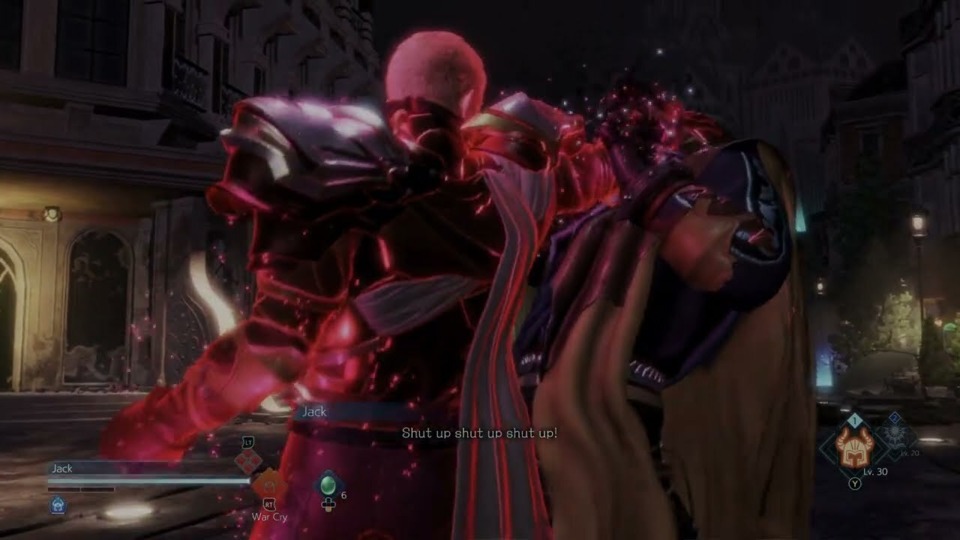
In one of my favorite moments in the game, while Jack mourns the loss of his friends and is surrounded by their corpses, he fists bumps the air as if he's doing one of his team-building exercises from earlier. While he screams, he absorbs a wave of darkness and recalls that a teleport to the mystical land of Lufenia exists in the Chaos Shrine. After fighting his way alone to the teleport, he returns to the land of his overlords, and when they detect the evil manifesting from him, they encase him in a crystal prison. While attempting to break out, Jack becomes Joker-fied. He screams and cackles about wanting to burn the world of Lufenian down to the ground while he remains isolated in his crystallized jail. It is here when Jack has a battle within himself to subdue Chaos and make them a part of their soul. This represents the game's final boss battle, and as I will review separately, it's a real pain in the ass, but after you beat Chaos, all Hell breaks loose! After Jack absorbs Chaos's essence, he threatens the denizens of Lufenia that if they ever mess with the world of Cornelia, he will end them. Obviously, Jack says so with three or four additional expletives. For reasons I still do not understand, despite Lufenia's ability to manipulate time and inter-dimensional travel, they become frightened of Jack's threat and affirm they will never meddle with Cornelia again.
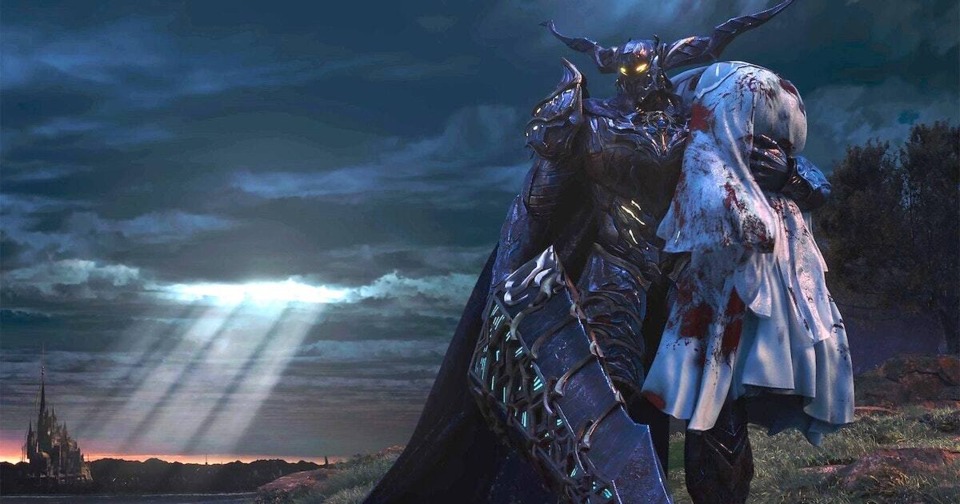
Then, we watch Jack become the "Jack Garland" of Final Fantasy 1. Now that I have hindsight, Nomura should have vetoed the executives who told him he needed to redo the story and advertising to make it explicit that Jack is Gardland from the start. While Jack embraces his role as a corrupted version of his former self, he kidnaps Princess Sarah, which leads to a fantastic callback to the game's introductory cutscene wherein Garland murders everyone in the Palace of Cornelia while attempting their kidnapping mission. However, with the context of us knowing that it is Jack, the mannerisms take a more comedic bent with Garland's slow and ferocious sword swings, now signifying the man under the armor is a very, very, very tired man done with everyone's bullshit. There's even an incredible scene where he drapes the princess over his shoulder, and it feels like a Curb Your Enthusiasm skit. With that "quest" behind him, Jack sits on the throne at the Chaos Shrine, awaiting the Four Warriors of Light to defeat him. However, before that happens, we watch the Four Fiends assemble around him. While they appear as monsters initially, the game filters their appearance to show that Jack's friends lie beneath the abominations, and he can still see them. And obviously, they celebrate the success of their mission with a fist bump. Would you have it any other way?
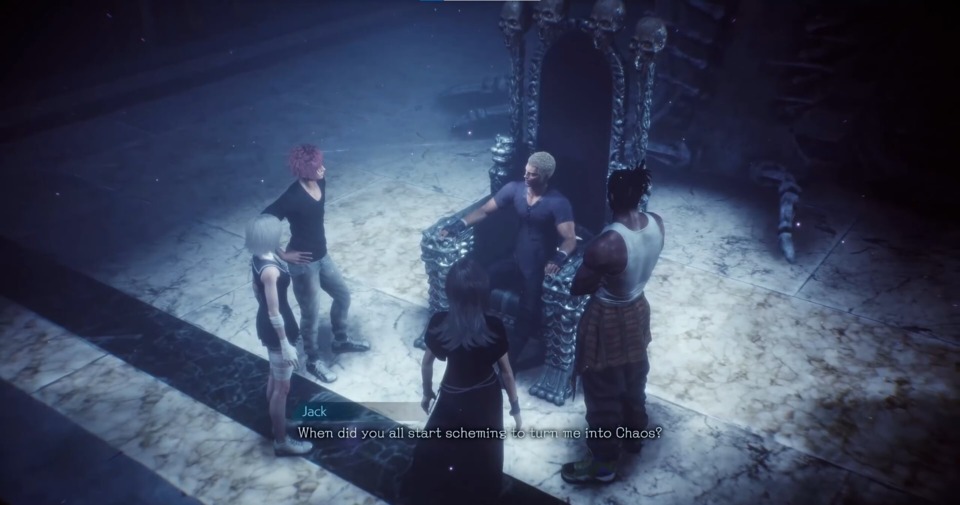
Tangent: The Last Boss Sucks!
I know, complaining about the difficulty of a final boss in a Final Fantasy game is petty, but there are a few things about this battle against Chaos that rub me the wrong way. On a positive note, I liked the detail that he has your friends' heads on his necklace. I also like the look of the environment you fight him in and some of his transformations. Chaos's second form, wherein he draws infinite magical power to himself and Jack, is a tremendous empowering moment because it allows you to unleash your full array of abilities at no expense. However, my core issue with Chaos echoes across many Final Fantasy final bosses: it prioritizes specific playstyles and character builds more than others. If you have yet to make a character that errs towards one of those build paths, you must toil away on this fight longer than most. As someone who enjoyed casting magic, the slower and more deliberative attacks I had come to prefer often set me up to be wide open for this boss's unique attacks and lunges. Those lunges are a real pain as Chaos can span across entire fathoms of the battlefield in an instant. This annoyance is widespread in Souls games, but it is not one that I'm doing cartwheels for as a celebration.

The other trick with this battle is that it impels you to be aggressive, which is slightly counterintuitive, with this being the final boss. You can run up on him using the teleport ability and even take advantage of back attacks and critical hit opportunities with melee-oriented jobs. Your best bets are doing so and sending his elemental attacks back at him. As a magic-oriented person, landing spells is tricky because he leaps across vast distances to always be in your maw. Likewise, while the party commands are imperfect and your companion's AI is downright moronic at times, being unable to draw aggro using allies makes some job types completely inert during the final chapter. There's still value in having a Sage or White Mage as a backup to ensure Jack doesn't meet an untimely demise, but your in-depth array of support classes feels utterly impotent during the last two levels without Jed, Neon, and everyone else. Yet again, I have to admit that this is par for the course with this genre, but again, I'm not a fan of this quibble elsewhere, and I'm not a fan of it here.
Part 10: I Want To Talk About Why I Think This Game Is A Self-Plagiarism
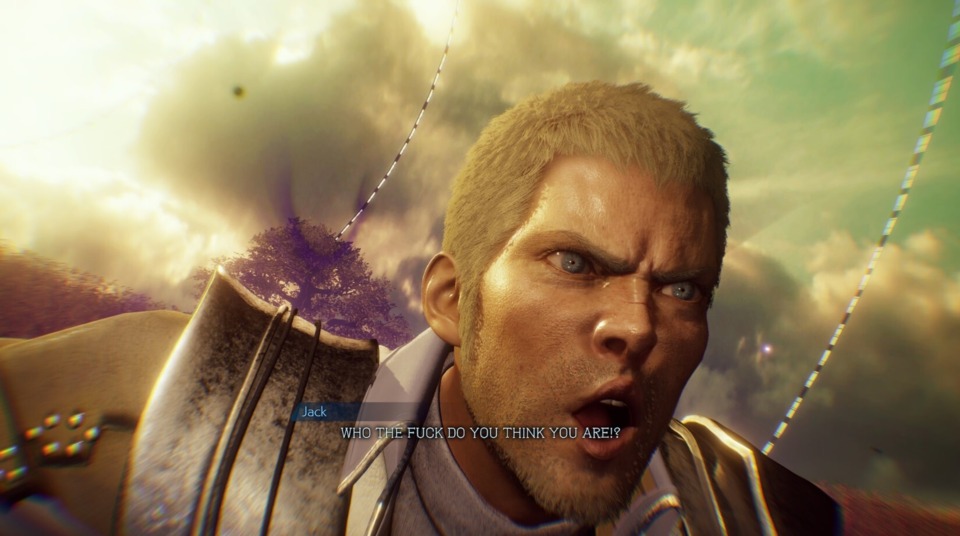
Around the time I got to the plot twist with the Lufenians, I started to feel déjà vu. Jack is a man of mystery thrown into a world that, over time, he falls in love with and discovers he can free from a vicious cycle of death and rebirth. It's not exactly a new or novel concept, but it seems fresh enough to the Final Fantasy series that people behind the game saw fit to use to recontextualize Final Fantasy I as we know it. And yet, I still could not shake off that sense of déjà vu. So, I discovered that Kazushige Nojima was the lead writer for the game and has been at Square since the late 1980s. His credits span classic SNES titles to this one and Final Fantasy VII Remake. For the most part, he functions as a scenario writer, but he's also dabbled in writing whole stories for games as well. Unsurprisingly, Nojima was the lead writer behind Dissidia Final Fantasy NT, a game whose universe some theorize Stranger of Paradise might take place in, given some of the implications of Stranger of Paradise's post-release DLC. Nonetheless, he also wrote the story of a game I want you to read the summary of and see if it sounds oddly familiar.
As an amnesiac man arrives in Palamecia on a stream of light, a mysterious voice introduces itself as "Vox" and explains his ties to the past are no longer valid in the world he is arriving. The man lies on a beach in a strange world with a sword in his hand and many others beside him. Monsters emerge, and the disembodied voice of Vox speaks of a law of Palamecia: "None shall remember the names of those who do not fight." After the men fight the monsters, Vox asks their names. The man remembers his name is Wol, but the other men remember having the same name. Vox explains that the name carries a special meaning, as it is the name of a hero foretold to bring hope to Palamecia: the Warrior of Light, and that one of the men will become that hero.
Considering the new arrivals "blank slates," Vox names them Blanks and advises them to go north. An armor-clad man appears to reiterate Vox's words. Vox introduces Wol a new law: "Your mettle is constantly being tested." As Wol continues his journey, he comments on how everything feels like home despite his memory loss.
Now, let's jump forward to this game's STUNNING PLOT TWIST!
After hearing the truth behind his adventure, Wol discovers what the Warrior of Light really is: a warrior who brings hope to the people of Palamecia in a period of crisis by defeating Chaos. Every time Chaos is vanquished, a brief period of light begins, but Palamecia is destined to fall again into darkness. When despair falls, new warriors from different worlds are called, without memory of who they were or where they came from, to Palamecia, in the hopes one of them would become the new Warrior of Light and defeat Chaos. Sensing this, Cid sent Sarah away to a faraway world to protect her with the letters Wol had found belonging to her, as she still sends Cid love letters from another world.
BUT WAIT, THERE'S MORE!
Making their way to face Chaos, Wol discovers along the way that they all have been following Vox designs from the very beginning, as Palamecia is serving as an engine to send hope for other despairing worlds, as the destroyed form of Chaos becomes a sea of darkness that spreads over the planet and wipe everyone's memories, allowing people to Hope for the destruction of Chaos continuously. Sarah is also not actually human but part of Palamecia, made to fill the role of the princess of prophecy. This extends even through Garland and Meia, even if they thought they acted on their own free will. When Wol realizes this, and seeing all that light channeling to him to defeat Chaos is nothing but another trick, they turn against Wol.
These passages relate to the story of Mobius Final Fantasy, a discontinued episodic mobile game that Kazushige Nojima worked on for five years. You likely have never heard of this game as it only saw a limited release outside of Japan, though it did curiously enough get a Steam release when Valve waived its rules prohibiting free-to-play systems. Now, I need to clarify that I am not accusing Nojima or, anyone at Square Enix or Team Ninja of academic or creative dishonesty. Nor are my suggestions anything more than pure speculation on my part. If there is one prominent rebuttal that you could poke on my assertions, it is that pesky issue of Stranger of Paradise's weird relationship with Dissidia. The Lufenians are already an established concept in Final Fantasy I and Dissidia, and the pocket dimensions that bring the Final Fantasy universe together in Dissidia are a known plot device. Nonetheless, even that suggests a certain degree of narrative self-plagiarism on Nojima's part. Even if you don't buy into my theory that this story is a reskin of Mobius Final Fantasy, whole swaths of it borrow from his work in Dissidia.
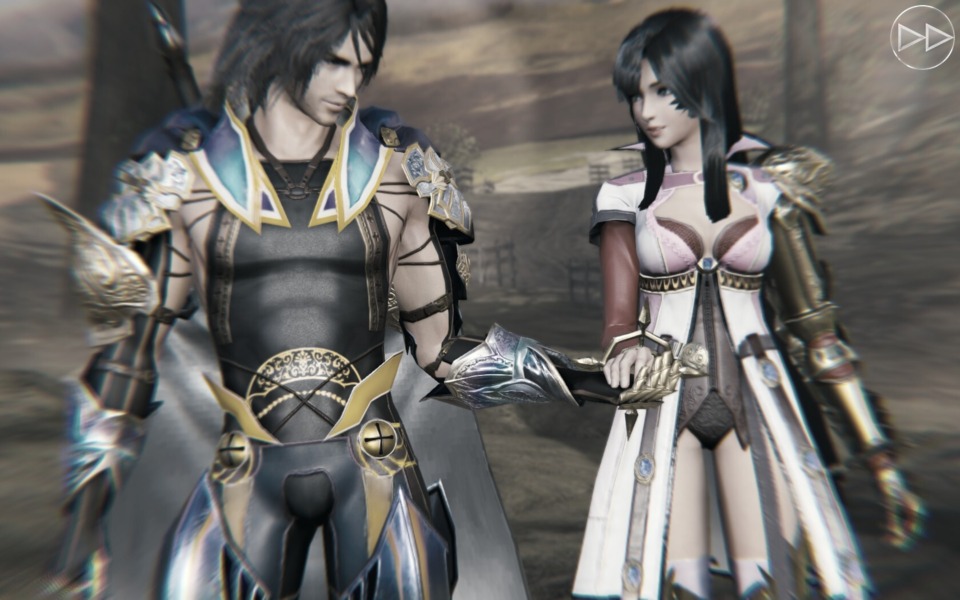
Also, I do have to give credit where credit is due. While the core of Stranger of Paradise is not in and of itself novel, its handful of spurts of originality make it distinctly unique. I cannot list a single game where two characters duke it out, and the act of doing so results in a fist bump that triggers a flashback. If you can think of any examples outside of Stranger of Paradise, please chime in because I could use that rush in my life right now. Those goofy-ass bits are another dividing line between whether you enjoyed Stranger of Paradise or consider it a mess not worthy of the effort. Especially if the combat doesn't click, if its zanier moments are putting a smile on your face, I can conceive it is worthwhile as long as you temper your expectations. I have met people who enjoy this game and the act of playing it so much that they are willing to paper over the issues of its being incredibly repetitive, and who am I to judge them for having a good time?

Nonetheless, let's list the odd similarities between Mobius and Stranger of Paradise. Woj and Jack start in dreamlike, ethereal worlds where they don't know where they are or what to do. Both are guided by disillusioned veterans of the lands they are exploring, and these figures are the ones that reveal the truth about the world. Woj learns more about the land he inhabits from Garland, and Jack has Astos. Both Woj and Jack fight an ornately dressed enemy that turns out to be a young woman under hypnosis or some form of brain control. For Woj, it's a heretical witch named Meia; for Jack, it is Neon. In both Mobius and Stranger of Paradise, Chaos is a means by which their protagonists can break a world stuck in a time loop. In both games, an omniscient voice or force attempts to prevent the protagonist from breaking this cycle. In both games, unleashing Chaos spawns a final battle that draws them to a void between two worlds or universes. In both games, the protagonist's implied, but not explicitly stated, relationship with Princess Sarah is what convinces them that they must save the world they inhabit. In both games, the protagonist must relinquish this relationship as part of their quest to set the world in motion again. In both games, their protagonist's heroic efforts result in the citizens of Cornelia having their minds wiped and not understanding their sacrifice for them. In both games, their primary protagonist is not of the world they need to save. In both games, their efforts to break this ouroboros are initially met with cheers and applause, but that transitions to skepticism and outright hostility when the going gets tough. IN BOTH GAMES, we find out this is not their first rodeo trying to do this. IN BOTH GAMES, someone in their party attempts to provide hints that things are not what they seem at first. I have only reached about the halfway point on my list, but I think you get my point. Things are slightly uncanny.
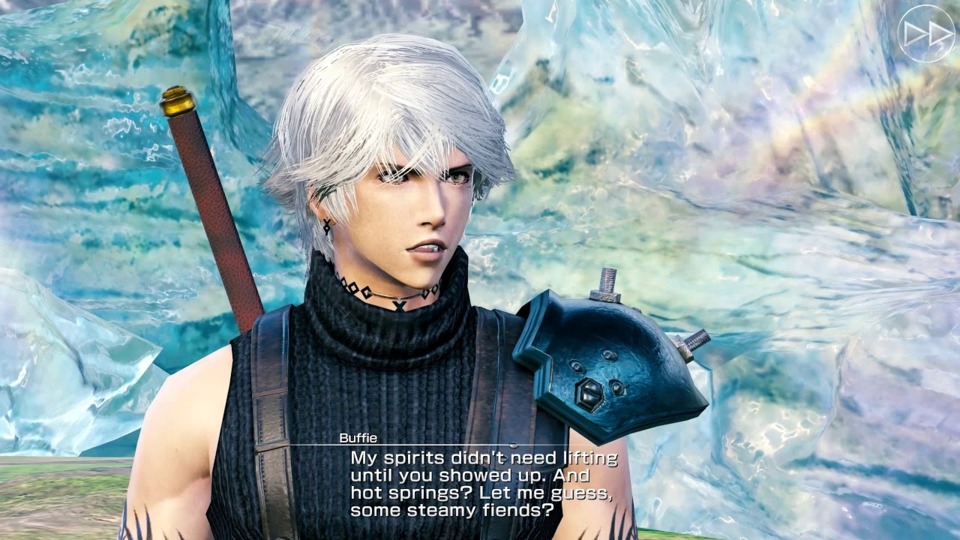
I want to make it abundantly apparent that I have no qualms with what Nojima has done if my hunch is correct. The man spent upwards of FIVE YEARS telling a story to a mobile game few people saw, and is now lost forever. Worse, he not only had the plug pulled from him on Mobius, but he was also the lead writer behind Dragon's Dogma Online, which also shut down while he was still completing its storyline. Oh, and let's not forget that he conceived the original script for Final Fantasy XV and was one of a handful who desperately tried to spearhead the game's ambitious DLC plans, which Square Enix ALSO PULLED THE PLUG ON! My guy rarely gets a break, and many of his more ambitious attempts at scenario writing and storytelling have failed. So, retrying something you did years prior with a company head's golden goose you know won't get canceled (i.e., Stranger of Paradise)? Yeah, I have no problem with that! Like, zero. Working in this industry sounds hazardous to one's health, so someone gaming the system in their favor with a title as big as this one seems like something we should celebrate with a parade rather than excoriate online with angry blog posts.

Post-Mortem: Should You Play Stranger of Paradise: Final Fantasy Origin?
Answering this question is trickier than it seems on paper. This game is a mess; even those who applaud it and its zanier sensibilities understand that to be a core truth. Whether Stranger of Paradise provides you with a worthwhile experience depends on if you want to see Nomura cook, how much nostalgia you have for the Final Fantasy franchise, and your ability to revel in rough but highly rewarding Souls-lite mechanics. Even though the game comes from Team Ninja and utilizes the same team behind Nioh and now Wo Long: Fallen Dynasty, this title is not a perfect fit for fans of From Software's works. There needs to be more environmental storytelling, and its difficulty is utterly out of wack. This point leads us to look at this game's appeal to long-time Final Fantasy fans who may or may not be fans of Souls-like gameplay gimmicks. The good news for them is that the core game provides an accommodating slew of on-ramps, the most prominent being an easy difficulty setting that switches the gameplay to mimic that of a Musou more than that of a Souls game. Yet, for even them, it could be a tough sell because this game lacks many of the series' distinctive long-running aspects and idioms. It's odd to say, but if you go into Stranger of Paradise expecting a Final Fantasy game, you will end up disappointed. It's a Team Ninja game first and a compelling story with in-depth and riveting subplots fifth. When you view it like you do a campy B-Movie, it's an uneven time but one with some novel and unique highs I didn't think was possible in a Nomura-led project.
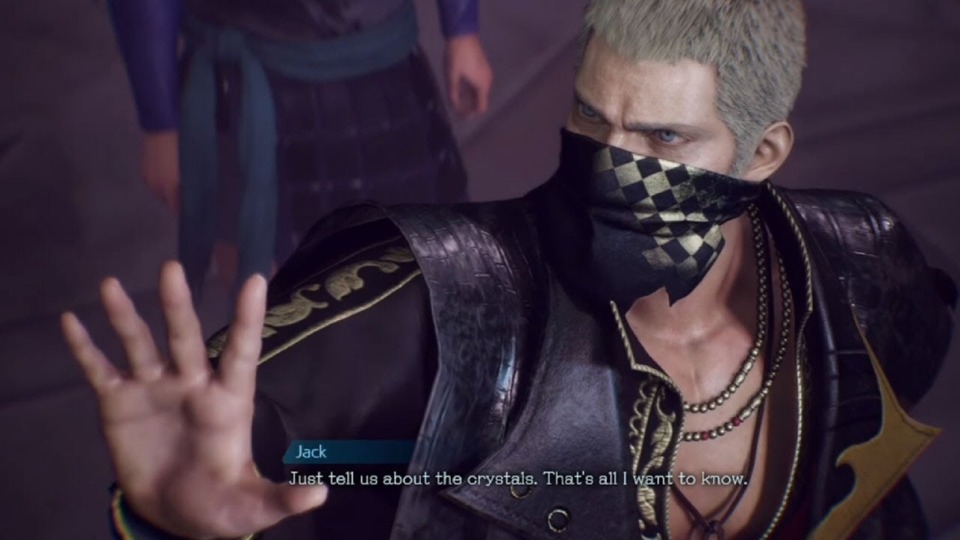
If ever there was a game, I wish I could apply the adage "it's a mixed bag" and then move on with my life, it is this one. It's an ugly game with a dumb story, and it doesn't always respect your time with its middle act, which feels more like a death march than an adventurous wind sprint. But HOT DAMN, when this game gets good, it gets GOOD! That moment when you see Jack Garland surrounded by his friends, having transformed into the Four Fiends, is one of the most magical moments modern Square Enix has made since Final Fantasy VII Remake. This game has dumb and earnest moments that are impossible not to smile at, and you know it was made with people who didn't have a single malicious bone in their bodies. Stranger of Paradise is far from Team Ninja's best outing, but there are decent to great ideas here that I hope they don't throw into the garbage can as they move on to other projects. I found the job system in this game far more rewarding than the blacksmithing in Nioh or the "Genuine Qi" system in Wo Long. While I spent a while giving this game a hard time for having a difficulty curve to that of a tomato can, if someone came to me and asked where to start with Souls-like games and had concerns about their endurance, this might end up on my shortlist for them.
Do you enjoy dumb diamond in the rough video games? And by "dumb," I mean incredibly dumb. As I have posited, everyone in the video game hobby has at least one game they will defend with their life because its stupidity appeals to their base senses so much that it "works" for them. We all have one "stupid" game that we love because it makes us smile. Suppose you can immediately think of your example of this phenomenon and the story of why that game sticks with you after countless years. In that case, consider playing Stranger of Paradise. It embodies the textbook definition of "low art" to a T, what with its shameless attempt to provide a mainstream action roleplaying game experience from a label that immediately caught people's attention. It errs towards craft rather than "fine art" and draws no contemplation from its audience. And yet, it is more than the sum of its parts because of its weird gaps, odd creative decisions, and absurd narrative.
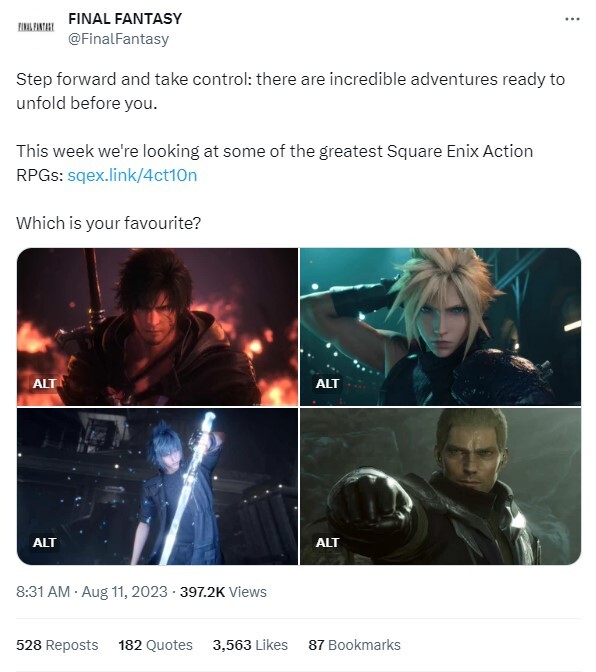
Final Fantasy Origin is a perfect fit for Nomura. I would prefer to see him work on weird spin-off side projects and run the Kingdom Hearts franchise into the ground than be the Lord Protector of the Final Fantasy franchise until his death. The franchise got lucky that Sakaguchi could maintain that role for as long as he was in it, but putting that burden on anyone else is a delusion. Nomura has been an "idea guy" similar to George Lucas, and much like Lucas, Nomura shouldn't be the one calling the shots 100% of the time with the franchise he's associated with. If you are going to keep him around, minimize his known shortcomings by giving him mini-projects like Stranger of Paradise, where he can provide the world with endless entertainment. Also, his stylistic and aesthetical preferences make way more sense when they are grafted onto a game with a more freeform and customizable structure. If Nomura makes a costume with three hundred belts, it doesn't feel all that egregious, considering there are plenty of others that don't look like that.
There is one camp of Final Fantasy fans that have decried this title that I wish to address. It is the cadre of people saying Stranger of Paradise somehow "ruins" Final Fantasy I. It's an absurd mindset to maintain. First, no one is taking your childhood memories of the first Final Fantasy away from you, and at the very least, this title putting a new spin on that game's universe might encourage more people to give one of its many remasters a shot. The game you love is NOT going away, and Square Enix, to its credit, provides ample opportunity for you to play it as you did decades ago. Second, what part of Final Fantasy I's story is the sacred cow? Is it the plot twist at the end wherein Garland reveals himself as the villain? Even the team behind the original game has made no qualms about how it was an experiment wherein they didn't exactly know what they were doing or how to tell a coherent story. They were going through the roleplaying motions they observed from Dragon Quest, Wizardry, and Ultima and, in doing so, created something that appealed to millions of people who had yet to experience a full-scale RPG from top to bottom.
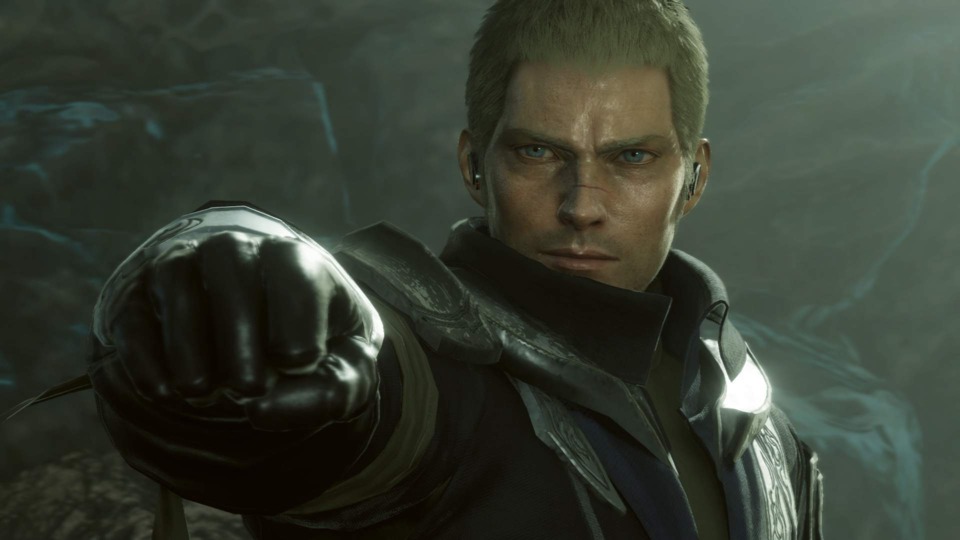
Nonetheless, there's nothing truly unique or even novel with its ideas, and it's far from the wholeness of storytelling and worldbuilding we now associate with the series. Let the people new to the series have fun, and those making these games have even more fun. And with that, I'll call an end to this series. Thanks for tuning in, and here's to a new Final Fantasy retrospective in the future!
